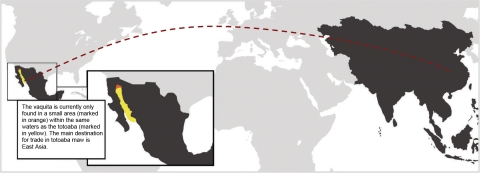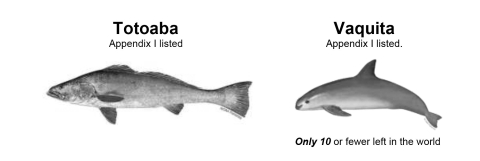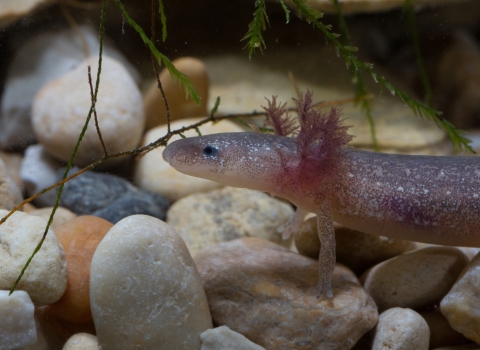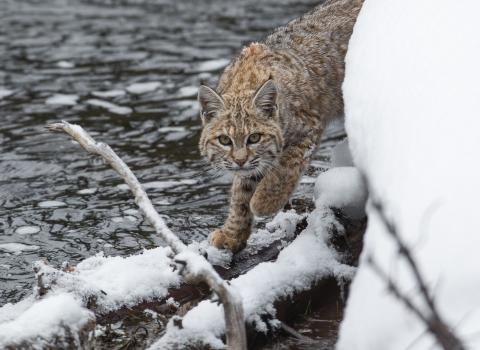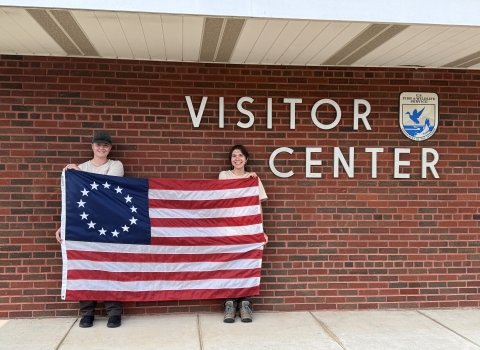Panama City, Panama. If the population of a species declines by nearly 50 percent each year, how long will it persist? The answer depends on whether we intervene.
Today, thanks to decisions adopted by the Parties at the 19th meeting of the Conference of the Parties to the Convention on International Trade in Endangered Species of Wild Fauna and Flora (CITES CoP19) in Panama City, Panama, the world has chosen to intervene, and the future of the world’s most endangered marine mammal feels a little more hopeful.
In the early 2000s, numbers of vaquita, one of the smallest marine mammals in the world, with the smallest range — it is found only in the northern part of the Gulf of California — were already low due to decades of deadly entanglements in fishing gear.
Then about a decade ago, a sharp increase in illegal fishing for a large fish called totoaba led to a catastrophic decline in the vaquita population — close to 50 percent each year.
Today, there are 10 or fewer vaquita left on earth.
The totoaba could face extinction too due to insatiable demand for its swim bladder – the driving force behind illegal fishing. Considered a delicacy in some parts of the world, a single totoaba swim bladder is valued at tens of thousands of dollars.
The intrinsic worth of two species found only in the long, narrow inlet that separates Baja California from western Mexico is worth much more.
Strength in numbers
Despite the diminishing numbers of vaquita, there’s still hope for the future of the species.
An international team of researchers published a genomic analysis in Science in 2022 that confirmed the remaining population, though small, is genetically healthy and can still recover if authorities enforce existing conservation measures.
Both vaquita and totoaba are listed on Appendix I of the Convention on International Trade in Endangered Species of Wild Fauna and Flora (CITES), which includes species threatened with extinction and provides the greatest level of protection, including a prohibition on international commercial trade.
But protections are only as good as their implementation. During the last visit to Mexico by the CITES Secretariat, local fishermen noted that fishing with illegal gillnets from illegal entry points happens daily without consequence. Illegal fishing is encouraged by a lack of alternative ways to make a living or to fish without using the gillnets known to be lethal to vaquitas. Despite Mexico’s ban on gillnets in the Vaquita Refuge, there has been a resurgence in their use.
Zero “zero tolerance”
The Vaquita Refuge is a federally protected region in the Gulf of California in which gillnet fishing is banned. The Zero Tolerance Area is a small priority region within the refuge where nearly all vaquita detections in the past five years have been made. Fishing activities of all types and transit of any vessels without authorization are strictly prohibited in the Zero Tolerance Area.
Yet, both have continued. In the last two published efforts to count vaquitas inside the Zero Tolerance Area, hundreds of fishing skiffs using gillnets were documented with no observations of enforcement actions.
Protecting a community
It’s not just vaquita that suffer from unchecked illegal fishing — it also undermines legitimate fisheries that many people in the region depend upon for their livelihoods. Fishing is the most important economic activity for the communities near the vaquita’s remaining habitat in the Upper Gulf.
These communities have suffered economically from the impacts of national and international legislation meant to protect vaquitas and totoaba. The only way to sustain the fishing economy in the Upper Gulf is for fishers to convert to legal and sustainable fishing practices.
And one thing is clear: the vaquita can’t wait.
During the 19th Conference of the Parties to CITES, the U.S. urged the other Parties to support strict enforcement of the gillnet ban and illegal fishing prohibitions. The united front for this support seen today at CoP19 is critical to affirm the merit of the treaty, and to save a species whose days are numbered unless we act now.


